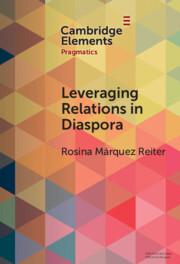Element contents
Leveraging Relations in Diaspora
Published online by Cambridge University Press: 14 February 2024
Summary
Keywords
- Type
- Element
- Information
- Series: Elements in PragmaticsOnline ISBN: 9781009206617Publisher: Cambridge University PressPrint publication: 14 March 2024
References
- 4
- Cited by

